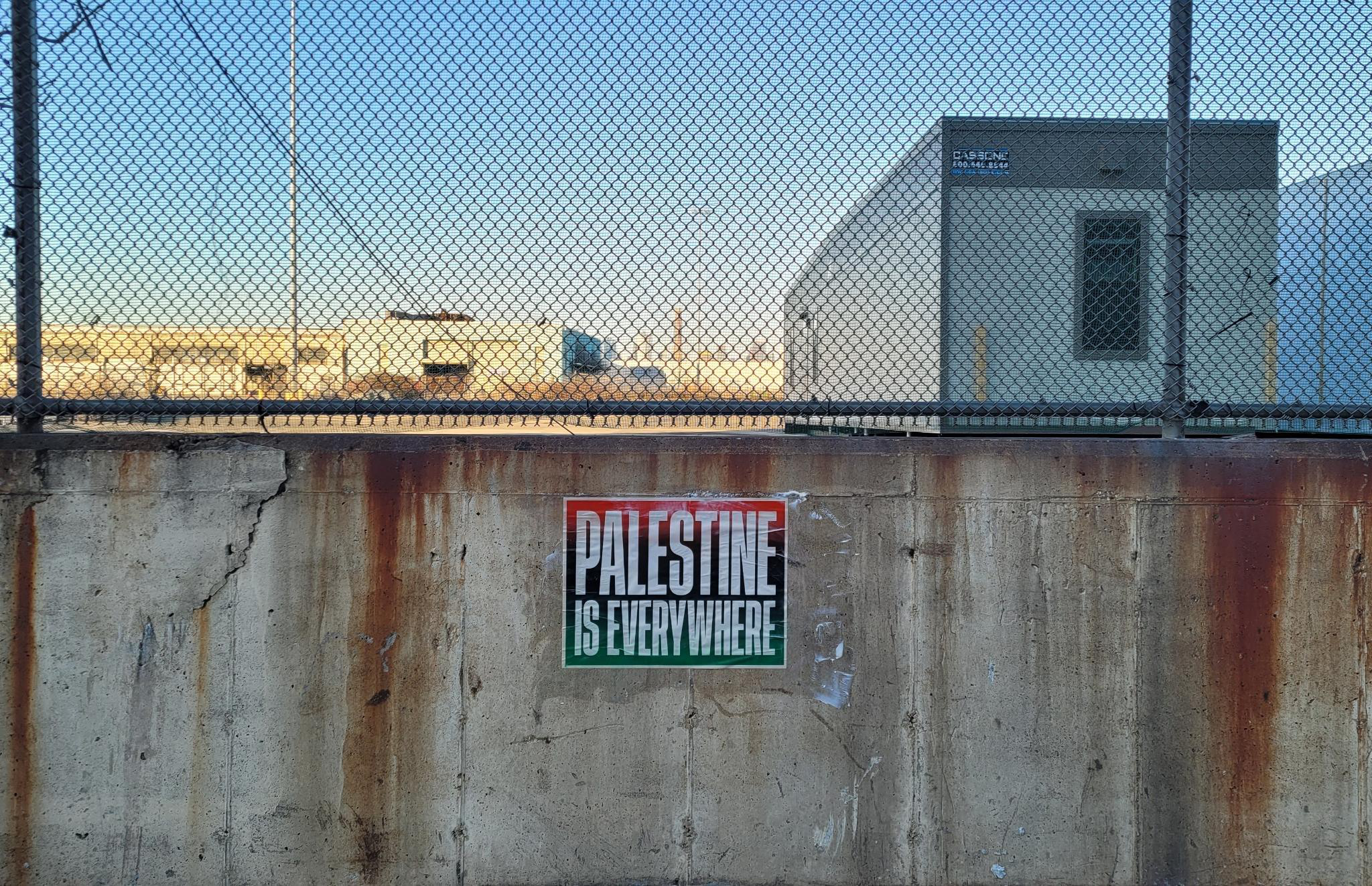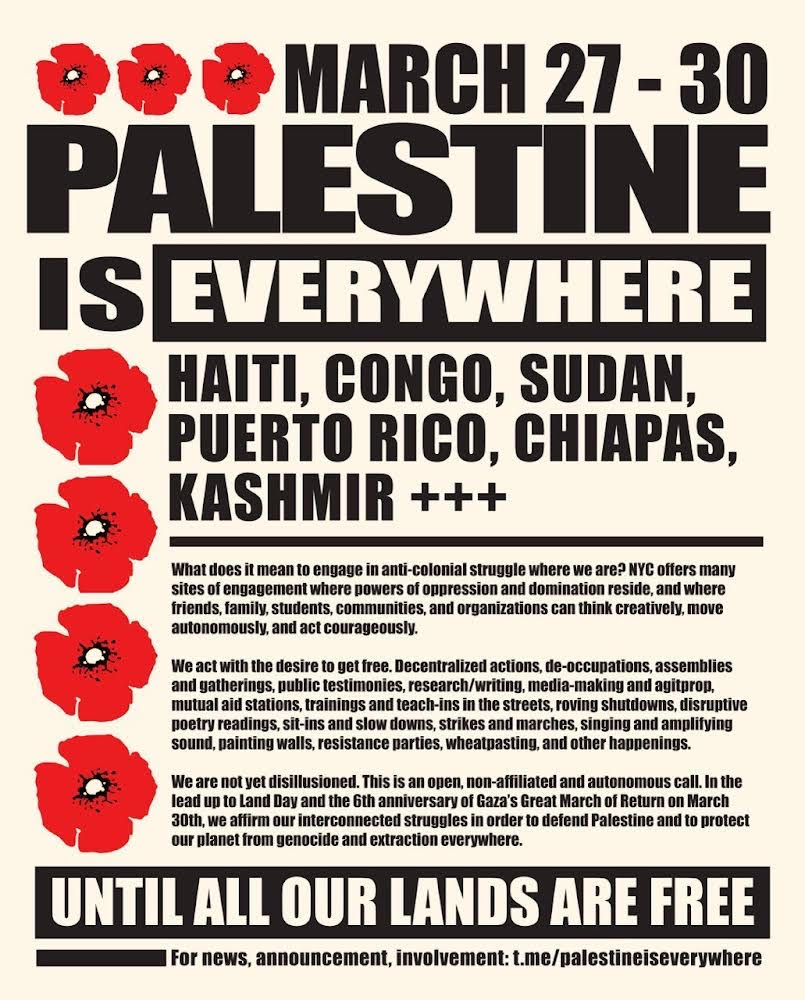[The following statement is a call for New York City to take autonomous action for Palestine from March 27-30. Get a group together, think creatively, move autonomously, and act courageously. To learn more, join the Palestine is Everywhere Telegram Channel: t.me/PalestineIsEverywhere]
Why have so many people in so many countries pledged their solidarity with the Palestinians in Gaza and the West Bank? First and foremost, a genocide is happening in Gaza in real time, and it is being televised, for the first time in history. No one should be silent in the face of that kind of horror. But that doesn’t fully explain why hundreds of millions have taken to the streets, week after week, in the months since October 7th. More than anything, Israel’s crimes against humanity, with the full-throated sanction of Western powers, have drawn a bright line across the globe that corresponds almost exactly to the colonial division of the world’s population. When the U.K., Germany, France and the U.S. stand with Israel and set themselves apart from the rest of the planet, they have reminded people how much power is still invested in the old colonial order. In the same way, the Palestinian struggle against a brutal settler aggressor has unavoidably reminded people, wherever they are, of their own decolonial struggles, and how they are all connected to the Palestinian resistance. In the global South, everyone has their own version of the “ongoing Nakba,” even if it does not resemble the Palestinian one in its details. Even in states, like Haiti, that have been sovereign for centuries, the long shadow of the racist metropole continues to wreak havoc. Puerto Rico, Sudan, Haiti, Congo, Kashmir, Cuba and many of the planet’s other flashpoints show the impact of the shared legacy of imperialism.
That is why when South Africa stepped forward at the International Court of Justice to point the genocidal finger at Israel and its enablers (primarily Washington and London), it spoke for so many others around the world. That is why Palestine is everywhere, and why we hear this chant, loud and clear, “in our millions, in our billions, we are all Palestinians.”
The international alliance that stands behind Zionism in the West includes the racist right, Judeo-Christian groups, and the neoliberal establishment. Globally, elites who trade in religio-nationalist populism are also aligned. As a result of their combined influence, Zionism has long been effective in dividing our own multiracial alliances, across borders and oceans. Until now. We are seeing an unstoppable torrent of outrage at Israel’s crimes, and it is eating away the transnational influence of Zionism. In our own countries, state repression has been rolled out to stop the bleeding. It won’t work. Because the complicity is too visible and the cause of Palestinian freedom is too compelling. When we look at the decimation of Gaza, we are also seeing the ruins of the old colonial order, in Africa, Asia, and the Americas. Because Palestine is everywhere, freedom fighters, martyrs, lovers, healers, and dreamers are everywhere.
Our desire for freedom is a planetary struggle beyond the nation state. Nation states are our prisons. We must be free of them and their property laws. When we chant and hear Free Palestine we are imagining a world that does not think of land, water, and air as private property and settlements, but as relations to care for.
A NOTE FROM NYC
For nearly six months, Gaza has bore witness to the most brutal campaign of genocide and ethnic cleansing that the zionist settler-colonial project has undertaken in decades. For nearly six months, the Palestinian people have been murdered, mutilated, starved, and displaced en masse. For nearly six months, the people of New York City have fought relentlessly against this genocide through mass mobilization, coordinated disruptions, creative actions, legal and cultural interventions, divestment campaigns, and more.
In response, we have seen an increasingly brutal wave of repression. New York State and city governments, along with board members and administrators at educational and cultural institutions, have deployed the NYPD and their own security forces to ruthlessly crush the latest uprising. Since October 7, thousands of protestors have been arrested with several of them sustaining injuries by police who were dressed in riot gear and utilizing surveillance technologies and repression tactics directly learned from the zionist occupation. Governor Kathy Hochul has brought the national guard into our subway stations as public transit infrastructure crumbles. Both news media and social media have suppressed pro-Palestinian speech. Universities, museums, corporations and state agencies have imposed bureaucratic measures to restrict access to public space and muzzle people’s right to freely assemble and speak.
The boundaries of action deemed acceptable by the forces of hegemony—the same forces manufacturing consent for and contributing materially to the genocide in Gaza—are closing in as people are rising up.
THE CALL:
Palestine is the center
Palestine is everywhere
Haiti, Congo, Sudan, Puerto Rico, Chiapas, Kashmir +++
Until all our lands are free
March 27 - March 30
What does it mean to engage in anti-colonial struggle where we are? NYC offers many sites of engagement where powers of oppression and domination reside, and where friends, family, students, communities, and organizations can think creatively, move autonomously, and act courageously.
We act with the desire to get free. Decentralized actions, de-occupations, assemblies and gatherings, public testimonies, research/writing, media-making and agitprop, mutual aid stations, trainings and teach-ins in the streets, roving shutdowns, disruptive poetry readings, sit-ins and slow downs, strikes and marches, singing and amplifying sound, painting walls, resistance parties, wheatpasting, and other happenings.
We are not yet disillusioned. This is an open, non-affiliated and autonomous call. In the lead up to Land Day and the 6th anniversary of Gaza’s Great March of Return on March 30th, we affirm our interconnected struggles in order to defend Palestine and to protect our planet from genocide and extraction everywhere.
 Spotted somewhere in Brooklyn, 3/24
Spotted somewhere in Brooklyn, 3/24
